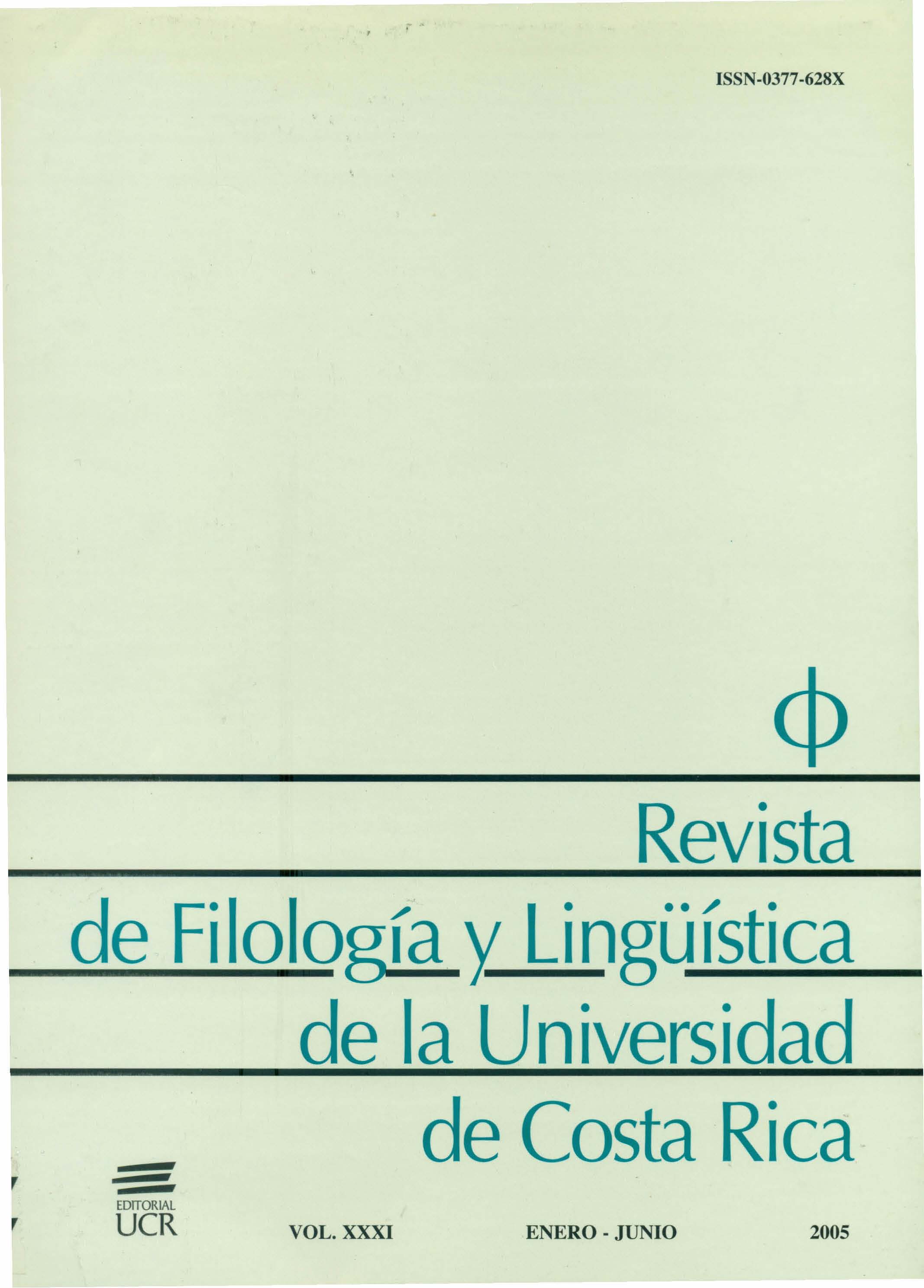Abstract
A multi-tiered theoretical framework that embraces ideas from pragmatics and interactional sociolinguistics is used to explain the various uses of pura vida in Costa Rican Spanish. Although there are numerous elements that comprise the associated language of Costa Rica, pura vida offers users a prime way of establishing claims to Costa Rican identity and allows them to express much of what is associated with in- group membership.References
Author unknown. 2004. “Buscando pares” [Electronic version], La Nación: San José: Costa Rica, 6/03/04.Baugh, John and Joel Sherzer (eds.) Language in Use: Readings in Sociolinguistics. New Jersey: Prentice-Hall, Inc. Beebe, Leslie and Howard Giles. 1984. “Speech-accommodation theories: a discussion in terms of second-language acquisition”. International Journal of the Sociology of Language.46, 5-32.
Beebe, Leslie and Jane Zuengler. 1983. “Accommodation Theory: An Explanation for Style Shifting in Second Language Dialects”. In: Wolfson and Judd (eds.), 195-213.Benavides, Rogelio. 2003. “Corona por Verónica” [Electronic version]. San José, Costa Rica: La Nación, 3/16/03.Brody, Jill. 2003. “A Linguistic Anthropological Perspective on Language and Culture in The Second Language Classroom”. In: D. Lange and R. Paige(eds.), 37-51. Duranti, Alessandro. 1997a. “Universal and Culture-Specific Properties of Greetings”. Journal of Linguistic Anthropology. 7 (1), 64-97.Duranti, Alessandro. 1997b. Linguistic Anthropology. Cambridge: Cambridge University Press.Eastman, Carol M. and Thomas C. Reese. 1981. “Associated Language: How Language and Ethnic Identity are Related”. General Linguistics. 21 (2), 109-16.Eastman, Carol M. and Roberta F. Stein. 1993. “Language Display: Authenticating Claims to Social Identity”. Journal of Multilingual and Multicultural Development. 19 (3), 187-202.Echeverría, Carlos Fernández. 1999. Pura vida [Electronic versión]. San José, Costa Rica: La Nación, 3/2/99. Foley, William A. 1997. Anthropological Linguistics: An Introduction. Oxford: Blackwell.Ford, Cecilia. 1993. Grammar in interaction: adverbial clauses in English conversations. Cambridge: University Press.Giles, Howard. 1973. “Accent mobility: A model and some data”. Anthropological Linguistics.15, 87-105.Giles, Howard, Justine Coupland and Nikolas Coupland (eds.) 1991. Contexts of Accommodation.Cambridge: University Press.Goffman, Erving. 1971. Strategic Interaction. Philadelphia: University of Pennsylvania Press.Gumperz, John. 1982a. Discourse Strategies. Cambridge: Cambridge University Press.Gumperz, John. (ed.) 1982b. Language and Social Identity. Cambridge: Cambridge University Press.Gumperz, John and Jenny Cook-Gumperz. 1982. “Introduction”. In J. Gumperz (ed.), 1-21.Hasbún, Leyla and Mayra Solís Hernández. 1995. “An Analysis of Assymmetric Use of Pronominal Address Forms in a Costa Rican Community”. Revista de Filología y Lingüística de la Universidad de Costa Rica. 23(2), 139-52.
Jakobson, Roman. 1960. “Closing Statement: Linguistics and Poetics”. In: T. A. Sebeok (ed.), 389-429. Jara, Carla. 2004. Personal communication.Johnstone, Barbara. 1987. “Perspectives on Repetition: An Introduction”. Text. 7(3), 205-14.Johnstone, Barbara. 2002. Discourse Analysis. Oxford: Blackwell.Lange, D. L. and R. M. Paige(eds.), Culture as the Core. Connecticut: Information Age Publishing. Levinson, Stephen. 1983. Pragmatics. Cambridge: Cambridge University Press.Lucy, J. (ed). Reflexive Language. New York: Cambridge University Press.Malinowski, Bronislaw. 1923. “The problem of meaning in primitive languages”. In: C. K. Ogden and I. A. Richards (eds.), 296-336. http://www.toasted-cheese.com/ezine/4-2/mannino.htmMerritt, Marilyn. 1984. “On the Use of ‘OK’ in Service Encounters”. In: J. Baugh and J. Sherzer (eds), 139-47. Mey, Jacob. 1993. Pragmatics. Oxford: Blackwell.Murillo Rojas, Marielos. 1995. “Pronominal Forms of Address in Costa Rican Preschool Children: Spontaneous Conversations”. Revista de la Universidad de Costa Rica. 19 (1), 17-27.Nofsinger, Robert E. 1991. Everyday Conversation. Newbury Park: Sage.Ogden, C. K. and I. A. Richards (eds.), The Meaning of Meaning. Cambridge: University Press.Rivera, Arnoldo J. 2003. “Ricky quiere subir ya al ring” [Electronic version]. La Nación: San José, Costa Rica, 07/09/03. Sacks, Harvey. 1975. “Everyone has to lie”. In: J. Sanches and B. Blount (eds.), 57-90.Sanches, J. and B. Blount (eds.), Sociocultural Dimensions of Language Use. New York: Academic Press.Sayahi, Lofti (ed.), Selected Proceedings of the First Workshop on Spanish Sociolinguistics. Somerville: Cascadilla Proceedings Project.Schegloff, Emanuel and Harvey Sacks. 1973. “Opening up closings”. Semiotica. 8: 289-327.Schilling-Estes, Natalie. 1998. “Investigating ‘self-conscious’ speech: The performance register in Ocracoke English”. Language in Society. 27, 53-83.
Schiffrin, Deborah. 2001. Approaches to Discourse. Cambridge, MA: Blackwell.Sebeok, T. A. (ed.). Style in Language. Cambridge: MIT Press.Sherzer, Joel. 1987. “A Discourse-Centered Approach to Language and Culture”. American Anthropologist. 89, 295-309. 1994. “Pointed Lips, Thumbs Up, and Cheek Puffs: Some Emblematic Gestures in Social Interactional and Ethnographic Context”. Proceedings of First Annual Symposium on Language and Society – Austin. Austin: Texas Linguistics Forum.Sherzer, Joel. 2004. Personal communication.Silverstein, Michael. 1993. “Metapragmatic Discourse and Metapragmatic Function”. In Lucy (ed.), 33-58. Stewart, Stuart. 2000. What Goes on in Cross-Language Encounters: The Tactics and Strategies of Interactional Grammar. Ph.D. Dissertation. Louisiana State University.Stewart, Stuart. 2003. “Language in context: Pura vida in Costa Rican Spanish”. Paper presen-ted at LASSO Conference, October 2003.Stewart, Stuart. 2004. “A favorite of ticos and gringos: Pura vida in Costa Rica”. Paper pre-sented at Cultural Encounters Conference, Tulane University, New Orleans, LA., April 2004.Tannen, Deborah. 1984. Conversational Style: Analyzing Talk Among Friends. NJ: Ablex.Tannen, Deborah. 1989. Talking Voices: Repetition, Dialogue and Imagery in Conversational Discourse. Cambridge: Cambridge University Press.Trester, Anna Marie. 2003. “Bienvenidos a Costa Rica, la tierra de la pura vida: A Study of the Expression ‘pura vida’ in the Spanish of Costa Rica”. In: L. Sayahi (ed.), 61-69.Varela, Ivana. 1999. “¡Pura vida! a la mexicana!” [Electronic version]. San José, Costa Rica: La Nación, 4/11/99.Vargas, Carlos Alonso. 1999. “Dos conceptos de pura vida” [Electronic versión]. San José, Costa Rica: La Nación, 4/28/99.Wierzbicka, Anna. 1997. Understanding cultures through their key words. New York: Oxford University Press.Wolfson, Nessa and Judd, Elliot (eds.), Sociolinguistics and Language Acquisition. Massachusetts: Newbury House.Yule, George 1996. Pragmatics. Oxford: Blackwell.

